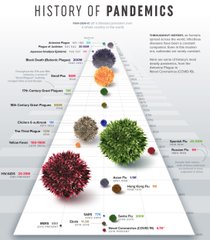The answer is: Yes.
But the aim of this article is not to lament what we should have done. Nor is it to crow about what we did do. Instead, it is to consider what we should do going forward.
One of the roles of strategy is to help businesses to be successful into the future. And we must do so for whatever the future brings. When something like COVID-19 comes along, we can't simply excuse ourselves for not having prepared for that future.
Now, I am not suggesting that any business strategist should have predicted exactly what happened.
For example:
- that a virus would emerge from Wuhan in late 2019/early 2020,
- that it would evolve into a pandemic and shut large parts of the world down,
- that it would overburden most countries healthcare systems, and
- that government would respond by locking their populations and economies down.
What could we have foreseen?
But there are many aspects of COVID-19 which were easy to foresee. These include, for example:
- a pandemic,
- a global economic downturn,
- the failure of stretched and global supply chains, and
- remote working.
These are things we've talked about in the past at length. We've even experienced these before. Perhaps not in our own lifetimes. And of course, each time they happen they're different.

We've had pandemics in the past. (You can click on the chart to the right to see it in more detail.) This 2015 Ted Talk by Bill Gates is one of many warnings of what future pandemics might be like. And we've long been aware of emerging strains on our health care systems posed by things like:
- population ageing and
- antibiotic-resistant diseases.
Likewise, we've had global economic downturns in the past. Arguably, as recently as 2008. Some argue that this one will be deeper and longer than any we've encountered to date. But even so, that possibility is not hard to imagine.
We've been worried about the impact of globalisation. Be that on the distribution of wealth or on the environment. We've also worried about possible disruptions to stretched global supply chains. Even if that concern was more fueled by concerns over a trade war between the US and China than by concerns of a pandemic.
And we've been debating the pros and cons of flexible and remote working for years. Until now, the status quo has conspired against them. However, in London, for example, the Olympics (see here), as well as numerous train strikes, have offered regular glimpses of the need for greater flexibility.
Our job as strategists is not to be experts in all of these fields. But we should be aware enough of the possibilities to help our organisations to understand and prepare for the specific consequences they might bring.
What should we do?
There are three steps to be prepared:
- Be aware.
The first step is to be aware. If we're not watching those Ted Talks, studying that macro-analysis or reading those risk reports then we won't know what's out there. - Consider the impacts.
Then we need to consider the impacts these things might have on our businesses. Each business is unique. And the so the impacts on each business will be different.
Consider, for example, how different the impacts of COVID-19 have been on hotels, airlines, restaurants and the highstreet, contrasted against the impacts on firms like Amazon, Ocado and Zoom. - Integrate this analysis into our planning and execution processes.
If our planning processes amount to simple extrapolations of last year's budget into next year's budget. COVID-19 highlights the significant uncertainties we face. And this underpins the importance of integrating scenario-based analysis and planning. (See: Scenario Planning: A Practical Guide for Navigating Uncertainty).
Once the planning is complete, the results need to be built into your execution processes. Early warning systems need to be put in place. Responses need to be rehearsed. Capacity for rapid change needs to be built.
What are the challenges?
Typical short-comings I have encountered in trying to achieve this include:
- Fatalism: Decision-makers conclude they can't predict or avoid crises. They call them 'black swans' and place them outside the bounds of normal logic. As a result, they can't or don't know how to prepare for them. Ultimately, they conclude that they're better off just ignoring the possibility.
It's true that you might not be able to guarantee that the Titanic would be unsinkable. But you could make sure she carried enough life-boats. - Theorism: Decision-makers engage in the analysis. But this fails to progress beyond being an "interesting exercise". Once it is complete, everyone goes back to their desks and carries on as before.
The only thing worse than facing a crisis with your head buried in the sand is facing it with your eyes wide open and in the full knowledge that you failed to prepare. - Optimism Bias: This is the expectations that whilst bad things do happen, they won't happen to me. The best time to repair your roof is when the sun is shining. But that's also the time when the need to do so seems less pressing.
When times are good, we fail to prepare for when they are not. And by the time they are not, it is often too late. Running cash reserves and building redundancy into your processes and supply chain seems like an unnecessary waste during the boom years.
We don't know how and when the COVID-19 crisis will end. So far, most businesses have been very reactive. Just trying to survive. But sooner or later* businesses need to start looking forward and preparing to succeed in the future. Whatever that may be.
*I would strongly suggest sooner.

No comments:
Post a Comment